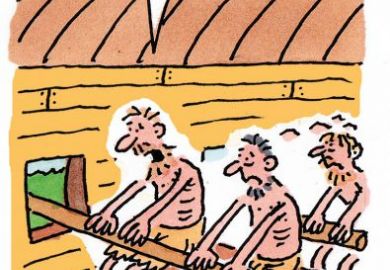
As each year passes, we might see the first signs of autumn in the emergence of subtle golds and reds on the trees, or in the first frosty chill on the night air. Or we might turn to the pictures of new students “slumped on the pavement covered in sick”, as The Sun revelled in the traditional freshers’ week coverage on 19 September. The newspaper focused on freshers at Portsmouth University, including “excited teenagers…dressed to kill and ready to dance the night away”, as well as those who were “trying to salvage a takeaway meal after clumsily dropping their cheesy chips on the ground”. It also noted the comments of Frank Furedi, professor of sociology at the University of Kent, who had spoken to The Daily Telegraph about a separate scheme helping drunk students make it home by giving them wristbands reminding them where they live. “There’s this assumption [at university] that if you get drunk, that’s an irredeemable problem…They should really just chill out and leave students to get on with stuff,” he said. One for the newspapers to bear in mind next year.
British students’ antics look tame compared with happenings in France, where dozens of armed police invaded a Paris university campus after a freshers’ week prank went disastrously wrong, the Daily Express reported on 22 September. With the French capital still on its highest terrorism alert, a group of students caused panic at ESSEC Business School, in Cergy, a suburb in northwest Paris, by shouting that an attack was under way, the paper said. Many students ran for their lives while others, fearing armed attackers were on the loose, made tearful phone calls to their families, with 30 officers attending the false alarm. “What’s unbelievable is that this prank wasn’t carried out by primary or secondary school students, but by university students,” said Frédéric Lauze, the head of the local public security division. “What if a police officer had actually shot someone?” he added of the hoax, which, under French law, is a punishable offence that can carry a two-year prison term and a €30,000 (£26,500) fine.
A master’s student was barred from studying cases of people who have surgery to reverse gender reassignment by a UK university, which feared criticism on social media, The Times reported on 23 September. James Caspian, a psychotherapist, was told by Bath Spa University that his research was “potentially ‘politically incorrect’” and therefore carried a “risk” to the institution, highlighting that “the posting of unpleasant material on blogs or social media may be detrimental to the reputation of the university”. Mr Caspian, who specialises in therapy for transgender people, accused the university of failing to follow “the most basic tenets of academic and intellectual freedom of enquiry”. Bath Spa University said that it was unable to comment while a complaint from Mr Caspian was being considered.
The rise of luxury student accommodation, offering facilities such as gyms and cinemas, is well documented – but it comes at a price. The BBC reported on 22 September that some Welsh students were taking out payday loans and relying on credit cards in order to cover rent costs that can approach nearly £200 a week. David Feeney, a property adviser, told the BBC that debt was “abstract” to many students. But NUS Cymru said that students “just want a decent house”. “There are the ones who have the money to look at these ones in Cardiff with gyms and cinemas, but there are many who are struggling to make ends meet and just need a home that they can afford to live in and run,” a spokesman for the organisation said.
A Mormon university has lifted its six-decade ban on selling caffeinated fizzy drinks on campus, The Daily Telegraph reported on 22 September. Announcing the end of the prohibition, Brigham Young University tweeted a picture of a can of Coca-Cola accompanied by two words: “It’s happening,” the Telegraph said. The Utahan university later confirmed that it had responded to increasing demand for soft drinks, with the move coming five years after the Mormon church clarified that the church health practices do not stop believers from consuming Fanta, Coke and other sugar-laden refreshments. “I’m a really big fan of caffeine and just soda in general so it’s nice to have it on campus with easy access,” said one delighted student, while another joked that it was the “best day ever”. Brigham Young graduate Amber Whiteley also explained how she used to get nasty looks when she brought Mountain Dew to campus almost a decade ago. “You youths will never understand the struggle we went through,” she joked.
Register to continue
Why register?
- Registration is free and only takes a moment
- Once registered, you can read 3 articles a month
- Sign up for our newsletter
Subscribe
Or subscribe for unlimited access to:
- Unlimited access to news, views, insights & reviews
- Digital editions
- Digital access to THE’s university and college rankings analysis
Already registered or a current subscriber?


